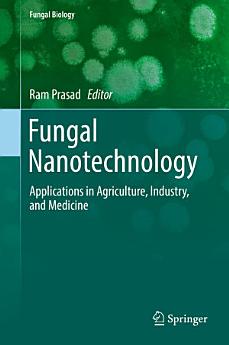Fungal Nanotechnology: Applications in Agriculture, Industry, and Medicine
Ram Prasad
thg 11 2017 · Springer
Sách điện tử
295
Trang
reportĐiểm xếp hạng và bài đánh giá chưa được xác minh Tìm hiểu thêm
Giới thiệu về sách điện tử này
Fungal nanotechnology has great prospects for developing new products with industrial, agricultural, medicinal, and consumer applications in a wide range of sectors. The fields of chemical engineering, agri-food, biochemistry, pharmaceuticals, diagnostics, and medical device development all employ fungal products, with fungal nanomaterials currently used in applications ranging from drug development to the food industry and agricultural biotechnology. Fungal agents are an environmentally friendly, clean, non‐toxic agent for the synthesis of metal nanoparticles and employ both intracellular and extracellular methods. The simplicity of scaling up and downstream processing and the presence of fungal mycelia which afford an increased surface area provide key advantages. In addition, the large spectrum of synthesized nanoparticle morphologies and the substantially faster biosynthesis rate in cell-free filtrate (due to the higher amount of proteins secreted in fungi) make this a particularly enticing route. Understanding the diversity of fungi in assorted ecosystems, as well as their interactions with other microorganisms, animals, and plants, underpins real and innovative technological developments and the applications of metal nanoparticles in many disciplines including agriculture, catalysis, and biomedical biosensors. Importantly, biogenic fungal nanoparticles show significant synergistic characteristics when combined with antibiotics and fungicides to offer substantially greater resistance to microbial growth and applications in nanomedicine ranging from topical ointments and bandages for wound healing to coated stents.
Giới thiệu tác giả
Ram Prasad is Assistant Professor at the Amity Institute of Microbial Technology, Amity University, Uttar Pradesh, India. Dr. Prasad completed his Ph.D. at the Department of Microbiology, Chaudhary Charan Singh University, Meerut, UP, India, in collaboration with the School of Life Sciences, Jawaharlal Nehru University (JNU), New Delhi, India. He received his M.Sc. in Life Sciences at JNU and also qualified CSIR-NET, ASRB-NET, and GATE. His research interests include plant microbe-interactions, sustainable agriculture, and microbial nanobiotechnology. Dr. Prasad has more than hundred publications to his credit, including research papers and book chapters, five patents issued or pending, and has edited or authored several books. Dr. Prasad has eleven years of teaching experience and he has been awarded the Young Scientist Award (2007) and Prof. J.S. Datta Munshi Gold Medal (2009) by the International Society for Ecological Communications; FSAB fellowship (2010) by the Society for Applied Biotechnology; Outstanding Scientist Award (2015) in the field of Microbiology by Venus International Foundation and the American Cancer Society UICC International Fellowship for Beginning Investigators (USA 2014). In 2014-2015, Dr. Prasad served as Visiting Assistant Professor in the Department of Mechanical Engineering at Johns Hopkins University, USA.
Xếp hạng sách điện tử này
Cho chúng tôi biết suy nghĩ của bạn.
Đọc thông tin
Điện thoại thông minh và máy tính bảng
Cài đặt ứng dụng Google Play Sách cho Android và iPad/iPhone. Ứng dụng sẽ tự động đồng bộ hóa với tài khoản của bạn và cho phép bạn đọc trực tuyến hoặc ngoại tuyến dù cho bạn ở đâu.
Máy tính xách tay và máy tính
Bạn có thể nghe các sách nói đã mua trên Google Play thông qua trình duyệt web trên máy tính.
Thiết bị đọc sách điện tử và các thiết bị khác
Để đọc trên thiết bị e-ink như máy đọc sách điện tử Kobo, bạn sẽ cần tải tệp xuống và chuyển tệp đó sang thiết bị của mình. Hãy làm theo hướng dẫn chi tiết trong Trung tâm trợ giúp để chuyển tệp sang máy đọc sách điện tử được hỗ trợ.







